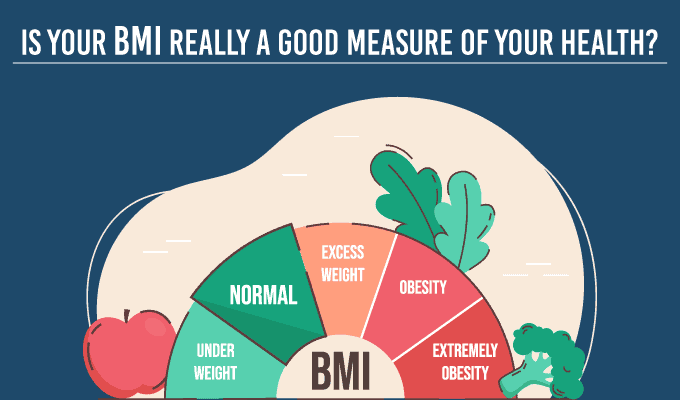Body Mass Index (BMI): Is BMI a Good Measure of Health?
 BMI stands for Body Mass Index and is a measure of health based on the height and weight of an individual. BMI is used to quantify tissue mass. It is a general indicator to categorise an individual into underweight, appropriate weight, overweight or obese categories.
BMI stands for Body Mass Index and is a measure of health based on the height and weight of an individual. BMI is used to quantify tissue mass. It is a general indicator to categorise an individual into underweight, appropriate weight, overweight or obese categories.
To learn your BMI score, the formula used is = mass (kg)/ height2 (m)
Hire a personal fitness trainer today
Take control of your health and fitness journey with a personal trainer
Contents
- Hire a personal fitness trainer today
- 1. What is the normal cut-off for BMI?
- 2. Risks associated with being overweight and above:
- 3. What if the BMI is below the average or normal cut-offs?
- 4. Is BMI directly co-related to body composition?
- 5. What does good health mean?
- 6. Is BMI relevant to good health?
- Conclusion:
- #Online body mass index calculator
- Hire a personal fitness trainer today
1. What is the normal cut-off for BMI?
The BMI classification chart as per the World Health Organization (WHO) for both men and women of 18 or above age is:
| Category | BMI range – kg/m2 |
| Severe Thinness | < 16 |
| Moderate Thinness | 16 – 17 |
| Mild Thinness | 17 – 18.5 |
| Normal | 18.5 – 25 |
| Overweight | 25 – 30 |
| Obese Class I | 30 – 35 |
| Obese Class II | 35 – 40 |
| Obese Class III | > 40 |
2. Risks associated with being overweight and above:

Try and maintain your BMI below 25kg/m2. Any number beyond 25 kg/m2 may face an increase in health issues, according to the centres for disease control and prevention:
-
- Hypertension: Abdominal obesity increases the risk for heart diseases. Hypertension can sometimes go undetected and may become a concern in later stages.
-
- Dyslipidaemia: There is high LDL cholesterol, low HDL cholesterol, high triglycerides and moderate levels of total cholesterol. Triglycerides and LDL cholesterol are bad cholesterol; whereas HDL is good cholesterol. Untreated or severe dyslipidemia can lead to other conditions, such as coronary artery disease or peripheral artery disease.
-
- Type II diabetes: Central obesity increases insulin resistance. The higher the insulin resistance, the higher the risk of developing type II diabetes.
-
- Coronary heart disease: With high LDL cholesterol, high BP and sugars levels, there can be a blockage in the arteries leading to coronary heart disease. If not corrected might lead to cardiac arrest.
-
- Stroke: High BMI along with blocked arteries might also lead to stroke. It can vary from mild to severe depending upon the comorbidities.
-
- Gallbladder disease: Excess cholesterol in the body might lead to gallstones and other diseases related to the gall bladder
-
- Osteoarthritis: Being overweight leads to increased weight and pressure on the knees and other leg joints. This can lead to osteoarthritis.
-
- Breathing issues: With increasing BMI, one can experience difficulty in breathing. Abdominal obesity might cause sleep apnea.
-
- Cancer risk: Being overweight is a direct risk factor for cancer.
-
- Psychological effects: Being overweight might cause mental stress, anxiety, or clinical depression.
3. What if the BMI is below the average or normal cut-offs?
-
- Malnutrition: Being skinny is a direct indication of being malnourished. It might also cause vitamin and mineral deficiencies.
-
- Compromised immunity: Low body weight can lead to low immunity and can also be majorly due to nutritional deficiencies.
-
- Osteoporosis: A low BMI might also lead to low calcium and vitamin D deficiency. It may cause the bones to become brittle and cause osteoporosis.
-
- Delayed milestones: In the growing years, if the BMI of the child is less, it might lead to growth and developmental issues.
-
- Hormonal imbalance: With high BMI, there can be hyperinsulinaemia. This can give rise to hormonal imbalance. PCOS is one such side effect of having a higher BMI for females. High BMI might also have the risk of complications during pregnancy and childbirth.
These are some possibilities that a person with high or low BMI can face. But we also see similar issues with people having normal BMI. So if someone looks healthy, is she/he actually healthy?

BMI takes into consideration the weight and height of an individual. But, at times, body composition and BMI doesn’t go hand in hand. Two people of the same age, height and gender might have different body compositions. It depends on the muscle mass and fat mass of the body. With the same impact of a fall, an underweight person might fall and get a fracture, but an overweight individual might not get injured at all. This can be because the bones of an overweight person might be strong and free of any deficiencies. Whereas an underweight or normal person can have calcium and vitamin D deficiency.
A person with a normal BMI might have more visceral fat compared to a person with a high BMI. A person with heavy muscles might have a high BMI, but the body fat is very less. BMI is one of the assessment tools to categorise people into healthy or not healthy categories concerning weight. So, then what is good health?
5. What does good health mean?

Good health means the absence of any diseases, normal metabolic processes, and no nutritional deficiencies.
It includes:
- Maintaininga healthy weight
- Increasingphysical activity and try to reach your fitness goal.
- Eatinga heart-healthy diet
- Track your heart health stats
- Keep your sugars in check
- Have healthy bones
6. Is BMI relevant to good health?
BMI is freely used by everyone to check if they have normal, high or low BMI. But it does have its limitations. BMI does not take into account the body composition of the person. With different people having different body compositions, you need other tools along with BMI to determine the healthy weight status of an individual.
BMI is greatly affected by age, sex, ethnicity, muscle mass, body fat, activity level and eating pattern. A person who might be old but with a normal BMI and is inactive might have higher body fat. Whereas an individual weighing more but doing more activities throughout the day might have low body fat. With age, body fat increases. Thus it cannot be considered the sole criteria to label anyone unhealthy. Women tend to have more body fat compared to males. Trained athletes might have high BMI due to muscle bulking.
Conclusion:
Having your BMI within the permissible range is very important. But it is not the only factor that will decide your health. You need to have a perfectly capable hormonal system, good mental health, clean eating, a flexible body, and normal blood parameters to consider yourself healthy. BMI alone cannot be used as the only criterion to determine health issues.
Being underweight or overweight might have some health implications. BMI is an imperfect measure of health, but it can be used as an indicator for any further tests required.
#Online body mass index calculator
Stop worrying about how you can calculate your BMI. You can now check your BMI online with the online BMI calculator. It will give you a fair idea about your health. You need to enter your details as asked, and you will get your BMI with just one click. Then you can take decisions for your body according to your BMI.
Read More Blogs: https://www.sudamshelar.in/the-truth-about-weight-loss-myths-and-facts/
Hire a personal fitness trainer today
Take control of your health and fitness journey with a personal trainer

Sudam Shelar
Sudam Shelar is a certified fitness expert and health coach, specializing in personalized training and nutritional guidance for optimal well-being. With a keen focus on dynamic workouts, corrective exercises, and tailored programs, he excels in muscle rehabilitation, personal training, and holistic wellness.


Leave a Reply